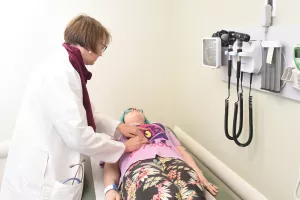Inflammatory bowel disease (IBD), consisting of Crohn’s disease and ulcerative colitis, can take a serious toll on your gastrointestinal tract from the moment food enters your body to when it leaves. So when you’re ready to live a life free from chronic inflammation, we’ll be ready to serve you an extra helping of relief.
Putting you back in control of your life
If you suffer from inflammatory bowel disease, you're far from alone. In fact, inflammatory bowel diseases are becoming more common and tend to reveal their symptoms when people are in their late teens to early 20s. It can be painful and places a big burden on your personal relationships, schooling or career.
Our team will do everything we can to help relieve that burden. Our doctors are active in research and can provide you access to the latest and most promising therapies. When you're ready to get your life back from inflammatory bowel disease, we'll be ready with a treatment plan that's uniquely you.

Conditions
Inflammatory bowel disease consists of Crohn's disease and ulcerative colitis. They’re similar in many ways and even overlap in symptoms, such as:
The key difference between Crohn's disease and ulcerative colitis is the body parts each condition affects. Crohn's disease can flare up anywhere between the mouth and anus, while inflammation from ulcerative colitis only happens in your colon.
Testing
During your first visit, we’ll do our best to give you a straightforward answer to what condition you’re dealing with or confirm a previous diagnosis you’ve received. Some of the tests we perform to get to the bottom of your discomfort include:
- Blood tests
- CT scan
- Endoscopy
- Imaging tests
- MRI
- Stool sample analysis
Treatments
It takes a village to treat inflammatory bowel disease, and you deserve a village of experts. That’s why we work with our colleagues throughout Tufts Medicine to foster a care team that covers you from all angles.
Radiologists and gastrointestinal pathologists can help diagnose your condition, while nutrition specialists can create a diet plan filled with foods you love without irritation. While these treatment options are on the table, your doctor will also map out if you’ll need to explore medication or surgery.
Medications
Common medications for inflammatory bowel disease include:
- Antibiotics
- Immunomodulators
- Immunosuppressants
If alternative therapies are the right fit for you, we’ll walk you through your options, including clinical trials for promising new medications.
Surgery
Sometimes, surgery is the best option for treating inflammatory bowel disease or repairing damage that has already occurred. If that’s the case for you, we’ll work with colorectal surgeons, endoscopists and other surgical specialists to determine the right approach.

From regular office visits to inpatient stays, find the healthcare you need and deserve close to home.

Meet the doctors and care team devoted to supporting you every step of the way along your path to better health.